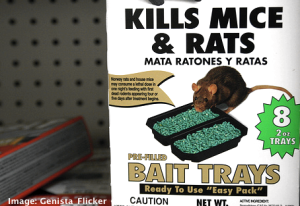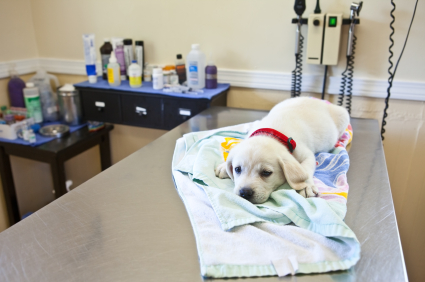Risks for Pets
 If you suspect that your pet has been exposed to rodenticides, take immediate action and contact your veterinarian or Animal Poison Control Center at (888) 426-4435*
If you suspect that your pet has been exposed to rodenticides, take immediate action and contact your veterinarian or Animal Poison Control Center at (888) 426-4435*
Pets and Rodenticides
Rodenticides
 Rodenticides vary by type and potency and are grouped by how they work. For example, anticoagulant rodenticides work by preventing the blood from clotting. Therefore, poisoned mammals (or birds) die by bleeding out. Find out more on different types of rodenticides from the National Pesticide Information Center’s (NPIC) fact sheet. It’s important to understand the risks of different rodent baits since some may be more lethal to your pet than others.
There is a further distinction between the first type of anticoagulants developed and newer types. First-generation anticoagulants are metabolized more rapidly and are less acutely toxic than the newer, more potent second-generation rodenticides (SGARs), which are largely responsible for pet poisonings. Treating pets poisoned by SGARs is also more difficult and expensive, and pets must be under veterinary supervision for a longer period of time. So, while all baits pose a high risk of poisoning, SGARs are more toxic and have a higher risk of poisoning for pets and other non-target animals that feed on poisoned rodents.
Rodenticides vary by type and potency and are grouped by how they work. For example, anticoagulant rodenticides work by preventing the blood from clotting. Therefore, poisoned mammals (or birds) die by bleeding out. Find out more on different types of rodenticides from the National Pesticide Information Center’s (NPIC) fact sheet. It’s important to understand the risks of different rodent baits since some may be more lethal to your pet than others.
There is a further distinction between the first type of anticoagulants developed and newer types. First-generation anticoagulants are metabolized more rapidly and are less acutely toxic than the newer, more potent second-generation rodenticides (SGARs), which are largely responsible for pet poisonings. Treating pets poisoned by SGARs is also more difficult and expensive, and pets must be under veterinary supervision for a longer period of time. So, while all baits pose a high risk of poisoning, SGARs are more toxic and have a higher risk of poisoning for pets and other non-target animals that feed on poisoned rodents.
Your Pet’s Exposure to Rat and Mouse Poison
 For pets that spend unsupervised time outdoors, it’s important to be aware that they can be exposed to rodenticides if neighbors or others use rodenticides to control rodents. Additionally, dogs and cats are sometimes intentionally fed rat poisons by people intent on harming a particular animal.
It’s important to always be aware of the risks, even if you don’t use these chemicals.
For pets that spend unsupervised time outdoors, it’s important to be aware that they can be exposed to rodenticides if neighbors or others use rodenticides to control rodents. Additionally, dogs and cats are sometimes intentionally fed rat poisons by people intent on harming a particular animal.
It’s important to always be aware of the risks, even if you don’t use these chemicals.
Pet Poisonings
- If you see or know that your pet has ingested rodenticide or has consumed a poisoned animal, take your pet to local veterinarian or emergency veterinary clinic.
- If your pet is exhibiting severe symptoms such as seizures, unconsciousness, or breathing difficulties, call ahead and take your pet immediately to an emergency veterinary clinic.
- Have the rodenticide package or name of the active ingredient handy to relay this information to the vet or animal poison control operator.
- If you suspect that a pet has swallowed a rodenticide, check their mouth for bright colors as these poisons sometimes have indicator dyes that leave a stain around the mouth or in stool or vomit.
- Also pay attention to changes such as loss of appetite or lethargy.
Common Symptoms
University of Illinois’s College of Veterinary Medicine identifies a range of symptoms that can appear in your pet. These symptoms may include lethargy, depression, weakness, trembling, drunken walk (ataxia), abnormal eye movement, paralysis, increased water intake, increased urination, bloody urine or a bloody nose, and gastrointestinal problems.Preventing Poisonings
Tips on Protecting Pets that Spend Time Outdoors
- Ask immediate neighbors if they use rodenticides and offer alternative solutions. If they do use rodenticides, ask them if they use tamper-resistant bait boxes. However, tamper-resistant bait boxes will not protect pets from secondary poisoning.
- For dogs, make sure your fencing does not have gaps that make bait stations in neighboring yards accessible.
- For cats, consider installing a fence that is specific for cats to decrease odds of your cat consuming poisoned rodents from neighboring yards. However, be aware that a poisoned rodent may enter your yard and poses a threat to any animal that consumes it.
- If you have had issues with neighbors complaining about your pet, stay alert and try to maintain an open dialogue. If you observe strange behavior from someone or find suspicious food products, contact your vet or ASPCA at (888) 426-4435. Also preserve a sample of any suspicious-looking material for authorities to test.
References
- The Animal Control Poison Center: Animal-specific poison center serving North America and is a member of the American Association of Poison Control Centers.
- The National Pesticide Information Center: An organization that provides information on pesticides.
- EPA Intent to Cancel Registration of Certain Rodenticide Products: Notice Document from EPA on cancellation of certain rodenticide products.
- The Humane Society of the United States: The nation’s largest animal protection organization.
- The American Humane Association: An organization committed to protecting the welfare of children and animals.
- University of Illinois at Urbana-Campaign, College of Veterinary Medicine: An educational institution committed to improving human, animal, and environmental health.


